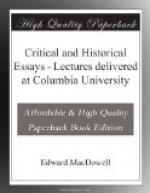The next stage is still a question of delineation; but of delineation that leads us into strange countries, and the sounds we hear are but the small door through which we pass. This music suggests; by way of example, the opening of the last movement of the “Pastoral” symphony, the march from Tchaikovsky’s “Symphonie Pathetique,” the opening of Raff’s “Im Walde,” and Goldmark’s “Sakuntala.” Such music hints, and there is a certain potency in its suggestion which makes us see things. These two divisions of music have been termed “programme” or “objective” music.
The other two classes of music have been termed subjective. The first is declamation, pure and simple; the singer may be telling a lie, or his sentiment may be insincere or false; what these sounds stand for, we know from the words, their grade of passion, etc. The last phase of our art is much more subtle, and is not amenable to such accurate analysis. If we may liken music to painting, we may, I think, compare the latter to the first three stages of this new language of music; but it can go no further. For that art must touch its audience through a palpable delineation of something more or less material; whereas music is of the stuff dreams are made of. It is hardly necessary to say, however, that our dreams are often much more poignant than the actual sensations caused by real occurrences would be. And it is because of this strange quality, I think, that dreams and music affect us in much the same manner.
The vital principle of Wagner’s art was that he not only made startlingly vivid pictures in his music, but that he made the people in these pictures actually walk out of the frame and directly address the audience. In other words, his orchestra forms a kind of pictorial and psychological background from which his characters detach themselves and actually speak. If they speak falsely, the ever present orchestra, forming as it were a halo, unmercifully tears away the mask, like the mirror in old fairy tales.
In Wagner’s operas, however, the intrusion of gross palpable machinery of the stage, as well as that of the actor’s art, too often clouds the perfect working of this wonderful art conception. It is just this intrusion of materialism in Wagner’s music dramas which constitutes their only weakness.
At this point I wish to insist upon the fact that in music it is always through declamation that the public is addressed most directly; not only that, but declamation is not necessarily tied by any of the fetters of the spoken word; nor is it subservient to any of the laws of articulate speech as we meet with them in language. This being admitted, I have no hesitation in giving my opinion that opera, or rather the music drama, is not the highest or the most perfect form of our art. The music drama as represented by Wagner (and he alone represents it) is the most perfect union of painting, poetry, and music imaginable to our nineteenth-century minds. But as regards representing the highest development of music, I find it too much hampered by the externals of art, necessary materialism in the production of palpable acts, and its enforced subjection to the laws that govern the spoken word.




